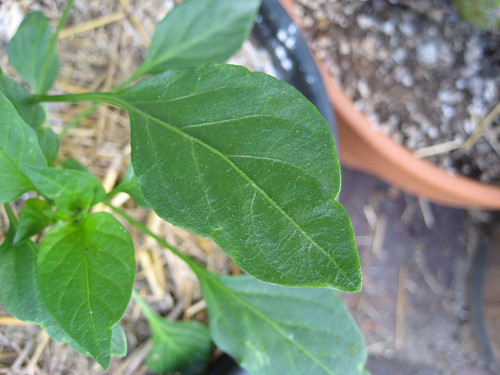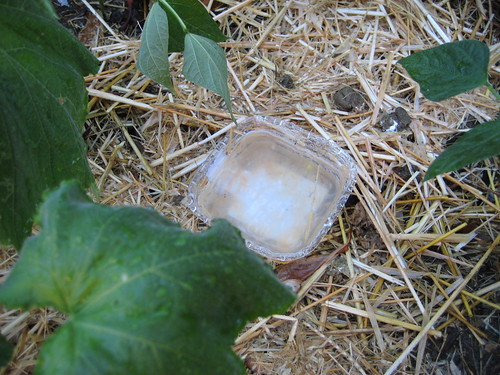It's true. Not only do I water too frequently, but I also water too briefly. Only recently have I come to terms with my over-watering habit and resolved to change.
I think my obsession with watering comes from two sources: (1) the arid Southern California climate means that topsoil dries very quickly (2) I am a nervous and impatient gardener. Instead of giving my garden a deep soak every 5 to 7 days, I would give it a short spray-down every other night. This, as you might imagine, lead to some problems.
Here's one tell-tale sign of my watering problem: a deformed pepper leaf.

Pepper plants--even ones in containers--don't need to be watered very often. If you give them too much water, the leaves get all bumpy and twisty and the plants don't set fruit. Since I stopped overwatering, my pepper plants have made nice, symmetrical leaves and started flowering profusely.
I think my over-watering is also the reason why my corn stalks can sometimes be unstable and my squash often die on the plant before they even bloom. I'm hoping that new, better watering habits will provide me with a bigger crop this summer. According to my research, it should.
The other day, I was talking to my dad about my debilitating overwatering addiction, and he gave me a very helpful tip. As you probably know, many gardening books, including my favorite--Burpee's The Complete Vegetable & Herb Gardener
"What does a tuna can have to do with anything?" You might ask. Well, here's the deal: You place a tuna can in your garden alongside your vegetables. Then, if you need to give your crop an inch of water, you water it until the tuna can is full. Since the side of a tuna can is about an inch high, it's a simple way to measure how much you've watered. Nice, huh? (By the way, my dad attributes his knowledge of this method to Texas gardening expert Jerry Parsons.)

I didn't have an empty tuna can available at the time I needed one, so I used an empty hummus container instead. It worked just as well. If you want to be really precise, you can use a rain gauge or a sprinkler gauge. (But a tuna can or hummus container is free.) It's likely I am not the first person to hear about this tuna can method, but I wanted to pass it on in case it might help someone else.
For the last couple of weeks, I've been pretty good about watering deeply and infrequently, and that's not just because I had a business trip last week. I think I am seeing the results of my restraint in heartier, greener plants. Hopefully, I can keep my addiction in check, although the dry, hot month of August will be a challenge.
The first step is admitting you have a problem.


I have a problem. The exact same one in fact. Thank god you addressed this. You've gonna save me and my plants considerable pain immediately. Rock on and thanks so much!
Think about putting in drip irrigation, with a timer. You get consistent watering, even when you aren't there to do it. It takes some time and money to install, but it's not hard to do yourself and it pays off in a short time. Watering by hand wastes a lot of water, btw, and lots of plants don't like to get their leaves wet.
I agree drip irrigation is great. You can customize for different plant beds or garden areas...here in the very hot, dry SW it is really the best, easiest and most efficient way to go!
A drip system would be great, but I don't think we can afford to put a good one in right now. It would be a rather elaborate endeavor, since I live on a fairly steep hillside and grow my vegetables in three separate beds. I do hope to install one eventually, though. I know they work much better, and save tons of water.
What I do is buy the seep hoses, and wrap them through the garden under the mulch. Then I move my main hose to each garden's seep hose about once a week and water for a few hours. Much much cheaper and easier than drip irrigation, but accomplishes roughly the same thing.
I also wrap the seep hoses around my trees to do the same thing.
I love this idea. I also like what is probably some deep generational-change symbolism, from tuna cans to hummus containers. ~Tom
Tom, that's so funny. I had a similar thought about the tuna can versus hummus container, but you were able to verbalize it in a great way.